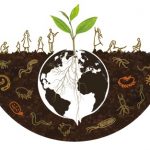The Alliance for Food Sovereignty in Africa (AFSA) and the Symposium of Episcopal Conferences of Africa and Madagascar (SECAM) call on AU and EU leaders to take note of the concerns expressed by broad based African civil society about the importance of the rural economy, family farming and small-scale food production, on which more than 60 percent of African households depend for their livelihoods.
The declaration is released in advance of the meeting of AU-EU leadership on 9 December 2020 in Brussels. It calls on policymakers to:
- Ensure space for civil society actors both inside and outside decision-making spaces. Civil society actors are struggling to take their rightful seat at the table, while others may opt to remain ‘outside’. Both must also be able to freely and safely make their voices heard, and to influence decisions.
- Recognize, value and support the huge potential of agroecology* to sustainably increase food security and food sovereignty, reducing poverty and hunger while conserving biodiversity and respecting indigenous knowledge and innovation. This requires a shift in the ways development programmes are funded as the trend clearly shows that such transformative approach is largely ignored by public funders[1]
- Recognize small-scale family farming as a viable structural model for the development of the agricultural sector.[2]
- Respect the African Commission on Human and Peoples’ Rights Resolution 431 on the Right to Food and Nutrition which calls on States to “Strictly regulate the importation of foreign food items as well as the promotion and marketing of industrialised and highly processed foods.”
- Accelerate the transformation to sustainable food systems through supportive policies and financial incentives that protect and enhance food producers’ access to land, seeds, water, credit, and local markets.
- Urgently rethink the approach to agricultural development in Africa, reverse the attachment to industrial farming systems and refocus on a holistic, sustainable and culturally appropriate model.
- Redouble efforts to support the African Union’s peace and security agenda and reduce violent conflicts on the continent, recognising that often woman, children and youth are the first to suffer.
- Support and develop the concept of territorial food systems,[3] decentralising value addition, stimulating the rural economy, localizing governance and strengthening the value chains where so much food is currently wasted.
- Stop the commoditization of Africa’s natural resources, bought and sold by multinational corporations and local elites. Future generations need enough productive land and living soil to nourish and provide livelihoods for their families and descendants, and maintain their cultural integrity.
- Protect and promote women’s rights to land. While they are recognized as the main contributors of labour in small scale farming systems, women represent a tiny fraction of agricultural land holders across Africa. Women must be guaranteed a strong voice on land governance and large-scale land acquisitions.
- Ensure that all large-scale land acquisitions must be preceded by transparent environmental, social and cultural impact assessment, and the prior informed consent of indigenous and peasant communities. Communities must decide what happens on their land and have the right to say no!
- Promote access to land for youth in order to reduce waves of migration and the unemployment gap in African countries.
- Move to adopt a legally binding UN treaty to ensure that transnational corporations are fully accountable for their human rights violations and environmental crimes.[4]
- Work together – EU, AU and civil society – to ensure the land remains in the hands of its legitimate users, and its management respects nature and reflects the needs and aspirations of the communities who live off the land.
[1] https://www.cidse.org/wp-content/uploads/2020/09/CIDSE-Agroecology-and-Finance-Briefing-Sept-2020-1.pdf
[3] https://www.righttofoodandnutrition.org/files/Watch_2016_Article_4_eng_Territorial%20Food%20Systems.pdf
[4] https://www.cidse.org/wp-content/uploads/2020/02/CIDSE-Submission-Feb-28.pdf Also see RECOWA, 2020, Message des Eveques Membres du 8eme Conseil Permanent
Download the declaration here In English

































